Party Lines
I was delighted to be asked to the official re-opening of
the refurbished Sherlock Holmes public house in Northumberland Street, just
around the corner from my old offices in Whitehall (whose exact location must,
of course, remain rather vague for security reasons).

The first floor bar of the pub is internationally famous for
its recreation of Holmes’ Baker Street living rooms, which can be viewed by
drinkers and diners through a glass wall and I was privileged to be allowed
inside this hallowed inner sanctum as a guest of one of its curators, Roger
Johnson of the Sherlock Holmes Society.
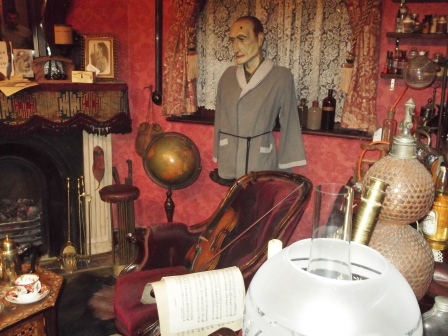 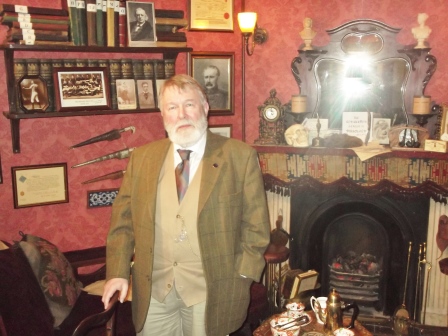
I have to admit to some trepidation when I discovered that a
‘Murder Mystery Evening’ performed by The Company Upfront, who specialise in
murder-mystery parties, was part of the re-opening festivities, for in truth, I
am rubbish at such games. I even failed to arm myself with a magnifying glass –
the traditional clue-hunting tool of all detectives – and so had to improvise
with whatever was at hand.
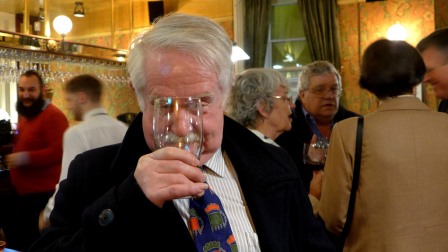
Fortunately, as it turned out to be a team game I was able
to worm my way on to Roger Johnson’s team and despite my ineptitude we managed
to come a creditable second when the murderer was finally unmasked and the
points (for spotting the clues) were totted up. I even came away with a
Certificate to prove I had solved the mystery, which now sits alongside my
equally-undeserved Sherlock Award here at Ripster Hall.
At February’s glittering Orion Crime Party, it was (as it
often is) a case of ‘So many authors, so many books; so little time’. Apart
from the pure pleasure of catching up with favourite authors I had not seen for
several years – such as the awesomely talented Denise Mina – I was excited at
the chance to meet new authors who had shown remarkable promise with their
debuts and even though I had composed a ‘shopping list’ of authors to talk to,
in the jollity of the occasion, I completely lost track of time.
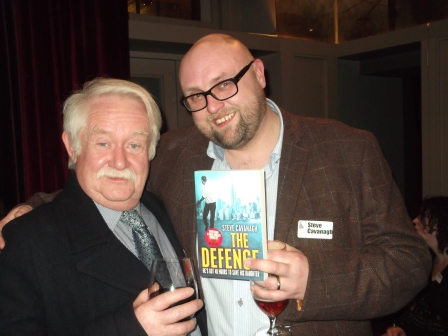
I was able, however, to meet Steve Cavanagh, whose second
novel The Plea comes out in May, featuring his con-artist-turned
lawyer Eddie Flynn in a high-octane American legal thriller. Our main topic of
conversation was, of course, why Steve chose to write violent crime fiction set
in the American legal system as The Plea opens with a massive
gunfight in the offices of a New York law firm. I could only deduce that the
charming (despite being a lawyer) Mr Cavanagh had found his native Belfast far
too peaceful and law-abiding.
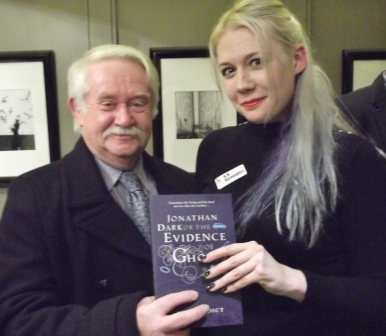
It was a real treat to meet Alexandra Benedict as I had
(then) just started reading her latest novel Jonathan Dark or the Evidence of
Ghosts, which I found spookily –
and I use the word accurately for once – addictive. It is mystery involving a
blind girl (who has had her sight restored but prefers to stay blind), the
police detective of the title, Jonathan Dark, who has – shall we say – certain
‘wardrobe secrets’ and the hunt for a violent stalker who may be connected to
an all-powerful organisation which would make the Masons look like a church
bell ringing team.
The setting is London, a London densely populated by ghosts
– so many that I am surprised Nigel Farage hasn’t started a campaign to deport
them – some of whom watch over Detective Inspector Dark and at least one who
might just lead him to the killer he is hunting.
Now all this might sound as if it needs a suspension bridge
of disbelief to sustain it but A.K. Benedict’s delightfully light touch when
describing both the quick and the dead (and sometimes the not-so-quick dead) is
a joy and the reader soon gets swept up in the narrative. Ms Benedict can
certainly turn a phrase: there’s a cameo for a high-powered public relations
lady called Hélène who has added the ‘e’
at the end of her name, and the acute, grave and Estuary accents. Not to
mention the breasts. And then a character speaks with a hint of irony in his answer, only slightly, but discernible, like the
colour of milk with a drop of blood in it.
My favourite, however, is the simile which compares an
overdone omelette to a lady who has… but, no, that one is certainly not
suitable for a family newspaper column. (And confused younger readers should
feel free to Google the word ‘newspaper’.) In short, go read the damn book for
yourselves. It is possibly the funniest, freshest, cleverest and slightly
bonkers thing on the crime scene you’ll find this year.
For a man of great age and infirmity such as myself, there
comes a time – however good the party is – where one has to make an excuse and
leave. As I did so, allowing the glittering crowd to continue the revelry into
the wee hours, another series of delights awaited me.

Not only was my exit delayed by the arrival of Mark
Sanderson, a crime writer and, like myself, a former crime fiction reviewer for
the Sunday Telegraph, who greeted me in the traditional way of Telegraph
employees, but I was also accosted by a charming member of Orion’s staff who
had a present for me. This was clearly a young lady of perception and good
taste as she had acquired for me (personally
I like to think) early uncorrected proofs of forthcoming novels by two fabulous
American authors: Charcoal Joe, a new Easy Rawlins mystery from Walter Mosley,
and A
Hero In France by that wonderful poet of the retro spy novel, Alan
Furst.
I am devouring these novels already. Thanks to Orion, they
will be available to mere mortals in June.
With regret…
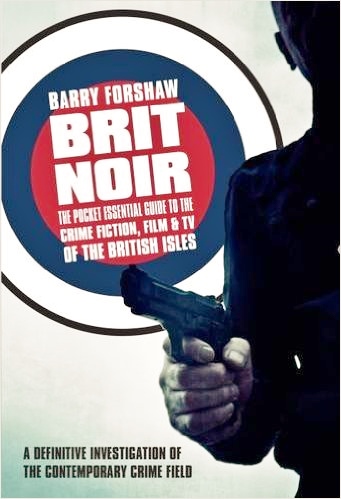 I am crestfallen to discover that I will be unable to be present
at fashionable Goldsboro Books in the heart of London’s West End next month for
the launch of Professor Barry Forshaw’s latest, no doubt seminal, work of
non-fiction Brit Noir. I am crestfallen to discover that I will be unable to be present
at fashionable Goldsboro Books in the heart of London’s West End next month for
the launch of Professor Barry Forshaw’s latest, no doubt seminal, work of
non-fiction Brit Noir.
I am particularly disappointed as this is, I think, the
first launch party to be thrown for one of Professor Forshaw’s scholarly works,
or at least the first one I have been invited to. I will try and contain my
distress by concentrating onmy responsibilities to the third Chianti Crime
Festival in Italy, which this year takes place in Pompeii and Naples. The wines
being sampled (in between the intellectual debates) will therefore not be
Chianti, but rather in the local tradition of Falernian wines, or Falernus, which, in the days of Ancient
Rome were served diluted with sea-water. I would naturally prefer to be
sampling the fine vintages on offer at the Brit Noir launch, but duty calls…
My responsibilities in Italy also mean I have had to decline
an invitation to speak at The British Library on 6th May, on the
subject of Eric Ambler, an author whose work I try and champion at any given
opportunity.
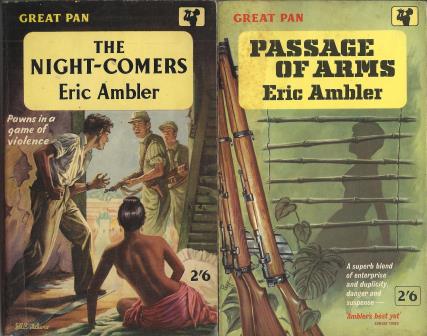
The Library’s evening seminar is a ticketed affair with
details at:
https://www.eventbrite.co.uk/e/eric-ambler-father-of-the-modern-british-spy-thriller-tickets-21029670310
Despite, or perhaps because, of my absence, I am sure the
event will go well thanks to the presence of dedicated and knowledgeable Ambler
fans Jake Kerridge, Barry Forshaw and Shots’
very own Ayo Onatade. I also understand that the British Library will be
publishing new editions of at least three classic Ambler novels, including The
Light of Day (filmed as Topkapi),
which I happen to know is one of Professor Forshaw’s favourites, Passage
of Arms and A Kind of Anger.
Or at least I think
that is what they have in mind, as I appear to have been excommunicated by the
British Library’s publishing arm and no longer receive information on their
very attractive reprints of ‘classic’ crime and spy fiction. I wonder if this
could have anything to do with the slightly (ever-so slightly) disparaging remarks
I made two years ago about their new edition of an E. Philips Oppenheim
thriller from the 1930s? Surely not; everybody has been disparaging about
Oppenheim.
Missing, believed dematerialised
As I seem to be out in the cold when it comes to British Library reissues, I have to rely on (the very reliable) Dean Street Press to keep me informed about crime fiction which was in vogue ninety years ago, even if some of it had been forgotten – until now – for over eighty years.
This month, Dean Street are publishing five ‘Golden Age’ mysteries by Annie Haynes – and I cannot make my usual ‘No, me neither’ comment as I have heard of Annie Haynes because Dean Street has already republished seven of her novels. The latest titles being: The Bungalow Mystery, The Secret of Greylands, The Blue Diamond, The Witness on the Roof and The Master of the Priory.
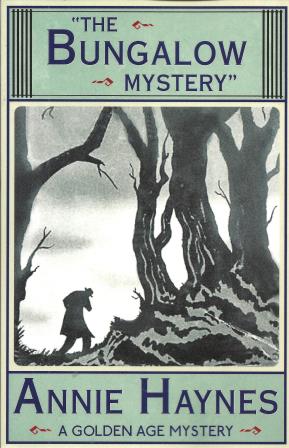
Little is known about Annie Haynes (1865-1929), but by doing a quick bit of maths, it seems that she began writing detective novels at the age of 58 and completed eleven in the six years before her death, plus one completed posthumously by a friend. But, as the Introduction to The Bungalow Mystery says: ‘Haynes’s books went out of print in the early Thirties, not long after her death in 1929, and her reputation among classic detective fiction readers, high in her lifetime, did not so much decline as dematerialise.’
And still honouring the Golden Age, the latest in Collins’ fabulous reprints from their Detective Club series of the 1920s, is Vernon Loder’s The Mystery At Stowe, originally published in 1928.
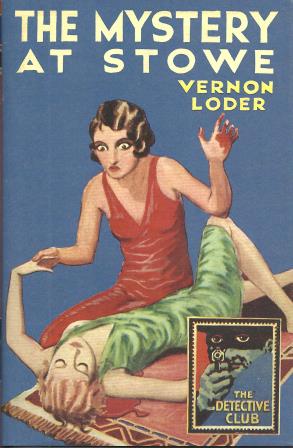
Vernon Loder was the pen-name, or one of them, of the prolific Belfast-born author John George Hazlette Vahey (1881-1938) and The Mystery At Stowe was the first of his twenty or so detective novels. I believe copies of Loder’s books to be incredibly rare, but the smart new Collins Crime Club edition will surely satisfy the ardent collector as well as reader, and at £9.99 for a hardback book, it’s a positive snip.
 |
|
Best Bestseller
I rarely look at ‘Bestseller Lists’ these days. It depresses me when I see titles high in the charts due to marketing rather than merit and if a really worthy book takes pole-position and it is written by a friend of mine, then something inside me dies.

I was, however, flipping through The Times last Saturday (which I buy purely for the weekly Latin Crossword) when I was sure my eyes were deceiving me. There, at Number 1 in the paperback bestseller chart, was the late Lionel Davidson’s classic adventure thriller from 1962, The Rose of Tibet.
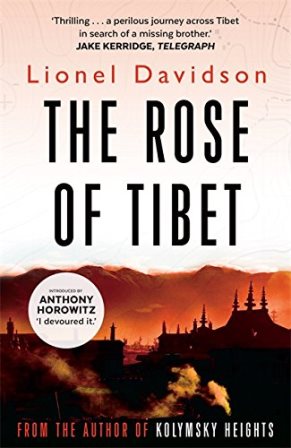 
My much-loved Penguin edition is now well over fifty years old and I was unaware that Faber were publishing a new edition complete with an introduction by Anthony Horowitz and a cover blurb (“Thrilling…a perilous journey across Tibet”) from the irritatingly young, but always astute, Jake Kerridge.
I have always maintained that it was entirely due to The Rose of Tibet and to Berkely Mather’s The Pass Beyond Kashmir that I passed O-level geography, something which greatly amused Lionel when I told him so in 2001. He was a man who gave lie to the old adage that you should never meet your heroes.
With regret
I was flipping through one of the many ex-War Office filing cabinets here at Ripster Hall the other day when I came across a copy of the Getting Away With Murder column from 1999 when it appeared in print form in the Sherlock Holmes Magazine. The main topic was a rant on my part about the Crime Writers’ Association’s John Creasey Award for best first crime novel and how it had failed in recent years to spot such emerging talent as Lee Child, Colin Bateman, Cristopher Brookmyre, Stella Duffy, Lauren Henderson, Nicholas Blincoe and Charles Higson. Indeed, there were two years in the 1990s when it was not awarded at all, presumably because nothing was “good enough”. (On one notorious occasion, the CWA had even published a short-list, naming the authors it subsequently deemed not good enough.)
Against this background, I speculated on some debut titles which I thought were worthy of consideration for the 1999 John Creasey, among them John Connolly’s Every Dead Thing, the funny football-based murder mystery Own Goals by Phil Andrews, Danuta Reah’s Only Darkness, and the very impressive The Chess Men by David Hood. (The 1999 Creasey eventually went to American Dan Fesperman for his most excellent Lie In The Dark, a book I had missed totally.)

My personal favourite had been Underdogs by Robert (then known as ‘Rob’) Ryan, a tough and violent thriller set in Seattle and I mention this not to rub salt in any wound caused by not winning the Creasey, nor to remind Rob of his fresh-faced debut publicity shot, but simply because, by coincidence, my rifling through the files happened on exactly the same day a copy of his latest ‘Dr Watson’ novel arrived through the letter-box.
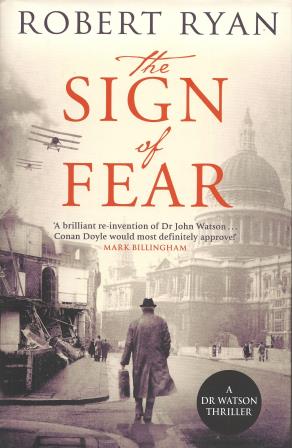
I am grateful to Robert for sending me a personalised copy of The Sign of Fear from his reserve stock as his publisher (Simon & Schuster) seemed determined to keep its light under a bushel, having published it without fanfare in January. I simply cannot understand why as this series of novels (this is the fourth) featuring Dr Watson ‘flying solo’ during the First World War whilst Sherlock Holmes glowers in retirement down in Sussex, has been universally praised. Last year’s instalment, A Study in Murder, was a particular favourite of mine and the first, Dead Man’s Land, was one of this column’s ‘Shots of the Year’ in 2013.
What’s Hot
There are so many good books coming out this month – as my postman is constantly complaining – that is impossible to do them all justice and so, for the moment, I will have to resort to far-too-brief summaries.
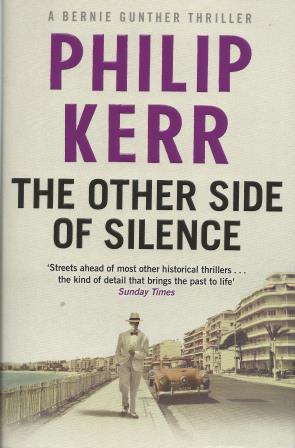
I know I will be accused of bias in recommending Philip Kerr’s The Other Side of Silence [Quercus] before I have even read it, but I don’t care. Kerr’s Bernie Gunther thrillers – the ultimate series of a good detective struggling to survive under the worst regime in the world – have shone like a searchlight in a night sky filled with Lancaster bombers when it comes to historical crime writing of the highest order. The Other Side of Silence, set in 1956 on the French Riviera, finds Bernie, having survived the rise of the Nazis, the war and various post-war adventures in South America, now comes up against possibly his most devious enemy – the English Establishment in a plot which involves the writer Somerset Maugham, a Nazi war criminal turned blackmailer and the haunting presence of those pesky defectors Burgess and Maclean.

Also set in 1956, although located in London and Oxford, against the background of an influx of refugees from the failed Hungarian uprising, I am relishing the prospect of She Died Young by Elizabeth Wilson [Serpent’s Tail]. I have said it before, and will go on saying it until somebody takes notice, that there is no-one better writing today who can conjure the sights and smells of bomb-scarred, dusty London in the post-war years.
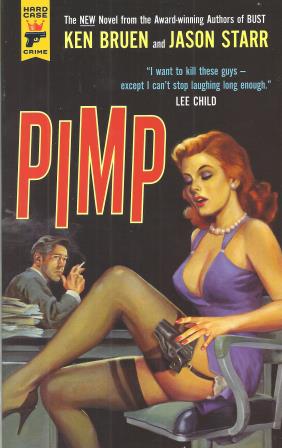
I have been a fan of American noirista Jason Starr ever since his chilling Cold Caller debut here in 1997. And as it is well known that I am contractually obliged to promote anything – even notes to the milkman – written by Irish hooligan Ken Bruen, I cannot help but recommend Pimp [Titan Books], which sees the two of them collaborating, yet again, on another adventure for former drug kingpin Max Fisher swimming (but not out of his depth) in the depraved waters of Hollywood. The ‘Pimp’ of the title refers, it seems, not to what you might think but to a new designer drug. Perhaps it’s best not to ask about such things, just sit back, relax, and enjoy.

Jeffery Deaver needs no introduction from me, though I always remind readers that he is a far more versatile writer than people give him credit. He is, of course, best known for his ‘Lincoln Rhyme’ series featuring the paraplegic forensic detective. The Steel Kiss [Hodder] is the twelfth Deaver novel to feature Rhyme and one of its themes is the manipulation of technology to murderous ends. Deaver has a good track record in this area. His 2001 thriller The Blue Nowhere was ahead of its time taking on the dangers of computer hacking and cyber-crime.

I hear much, and all of it good, on my grapevine about Kate Medina’s second novel Fire Damage [HarperCollins] especially after her well received debut White Crocodile for which she drew on her personal experience as a troop commander in the Royal Engineers. Her new novel also has a military theme, involving an investigation into the suspicious death of a British army officer in Afghanistan.
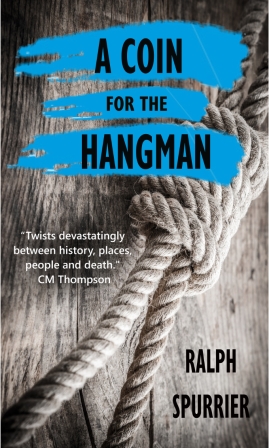
For several months now, if not years, I have been promised – nay, threatened with – sight of a copy of the debut novel A Coin for the Hangman by Ralph Spurrier, the owner of Postmortem Books, who has frequented these columns in the past under his nom de guerre of The Postmortem Man. I am unreliably informed that the book will appear one day soon, quite likely on 5th April.
Seeing, and reading, sense
I am delighted that the Cabinet Office has seen sense and overturned the ridiculous suggestion made by some of the young radicals in the House of Lords to abandon the ancient tradition of writing Bills and Acts of Parliament on vellum. It has always been my preferred medium despite complaints from pusillanimous publishers that drafts of my novels are “hard to scan” – whatever that means.
I am confident that vellum will make a glorious return, just as I predicted that tiny electronic screens would never replace real books and that vinyl would never die. Okay, so I admit I was wrong about eight-track in-car stereos – and the least said about Betamax, the better.
Secret Admirer?
Among the hundreds of Valentine’s cards I received last month, only one came from a truly unidentified sender.

It is inscribed, rather ominously “Be My Valentine – Or Else” and is signed “See you soon, lover – Judith”. The card also appears to have something to do with a book I have not read (yet) called Maestra, but quite what it all means is beyond me.

Despite my protestations that I know of no Judiths who would be likely to send me such a card, the Dowager Lady Ripster was not amused and has suggested that I may be in need of something called ‘relationship counselling’. To that end, she has booked me a private session with a therapist called Dr Lisa Hilton, which I suppose, for the sake of peace and quiet, I will have to go through with.
Pip! Pip!
The Ripster
|